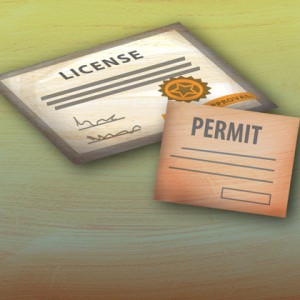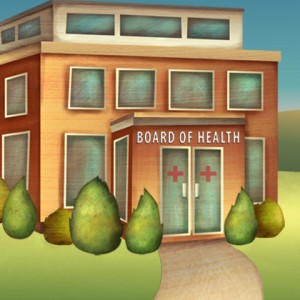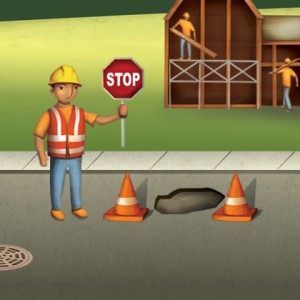Hopefully you’re now much more aware of the many programs and services your county’s thousands of elected officials and staff provide. Many are functions of government you never see; others are visible every day—think fire protection, traffic signals, sheriff’s patrols, drinkable water. Seen or unseen, one thing is for certain: your life in Georgia would be drastically different if these many county services weren’t provided for you. Or worse, if you had to provide them for yourself. Fix any potholes, arrest any criminals or purify any water lately?
COUNTY SERVICES
Hopefully by looking at our illustration, and by all the little yellow signs you saw denoting county-provided services, you get a sense of just how many things your county does to make your life better, safer and more convenient. Click on the tiles below to see what makes up that service—if you’re like many people, you’ll be surprised to learn of all the ways your county is here for you.
WHO’S WHO IN YOUR COUNTY
COMMISSIONERS & CONSTITUTIONAL OFFICERS
County Commissioners make up a county’s governing authority and direct and control county property, levy certain taxes, adopt county budgets, develop and maintain county roads and bridges, and handle many other functions related to the health, safety and welfare of the community. County commissioners are elected to four-year terms. The county commission chairman is either elected directly by the voters or through an annual election by the commission itself, depending on the county’s enabling legislation.
The Sheriff is elected to a four-year term with the right and duty to enforce the laws that protect the lives, persons, property and health of the people in the community. They also execute and return court orders, oversee the county jail, and conduct other public safety functions.
The Clerk of Superior Court maintains court records, registers property transactions and records subdivision plats. Elected to a four-year term, the clerk may appoint deputy clerks to help them perform their duties.
The Judge of Probate Court oversees all aspects related to deceased people’s wills and the proper distribution of their estates. They also appoint and remove guardians for minors and incapacitated adults, and administer oaths, issue marriage licenses, hear traffic cases, and more.
The Tax Commissioner receives all tax returns, maintains county tax digests, receives property tax exemption applications, and issues executions against delinquent taxpayers.
OTHER ELECTED OFFICIALS
The Magistrate Court Judge serves a four-year term and hears applications for, and issues, search or arrest warrants, grants bail, issues subpoenas and the like. They may appoint other magistrates to serve a concurrent term.
Superior Court Judges have original, exclusive, or concurrent jurisdiction of all civil and criminal cases granted to them by the state constitution and through state law. They have exclusive jurisdiction to oversee certain cases such as felonies, divorce, equity, and cases involving land titles, among other matters. They also review and correct errors made by lower courts. Each county has its own superior court, although a judge may serve more than one county. The chief judge handles the administrative tasks for their judicial circuit.
State Court Judges oversee misdemeanor violations, like traffic cases, and all civil actions, regardless of the amount claimed, unless the superior court has exclusive jurisdiction. State court judges can hold hearings on applications to issue search and arrest warrants and preliminary hearings, among other duties. Not every county has a state court.
The Coroner is elected to determine the cause of death when people die from violence, suicide or casualty, when they die suddenly when they were in apparent good health, when a physician was not present and in any other suspicious or unusual manner. Instead of a coroner, some counties elect a medical examiner that basically has the same duties and responsibilities.
The County Surveyor is either elected or appointed and surveys county and district lines, conducts other surveys for the county and maintains plats of all surveys made. In counties where the surveyor office is vacant, the governing authority may appoint any licensed land surveyor to perform the surveyor’s duties.
KEY COUNTY STAFF
County staff varies among local governments depending on the size of the community and its programs and services. While positions may vary based on the county’s form of government, the following are some of the more common ones:
The County Manager / Administrator runs the day-to-day operations of the county, supervising county departments and their employees, administering laws, preparing a budget and more.
The County Attorney oversees and advises the governing authority and other county officers on their powers and duties under the law, prepares legal documents, reviews contracts and may represent the county in court. The county attorney may be a full-time staff member or work under contract for the county.
The County Clerk records the board of commissioners’ official actions, prepares correspondence and reports and maintains county records, among other responsibilities.
The Emergency Management Director oversees the use of funds, makes contracts, and obtains and distributes equipment, materials, and supplies for emergency management uses to protect people in the event of natural or manmade disasters.
The Public Works Director oversees operations and maintenance of infrastructure like roads and bridges, and sometimes water, sewer and other systems. In counties where the primary or exclusive responsibility of public works is for roads and bridges, the director may be called the Road Superintendent.
The 911 Director manages the 911 system/call center and supervises 911 operators.
The Elections Supervisor prepares for and operates the county election process.
The Finance Director handles the overall administration of the county finances and coordinates all financial activities for the county manager or administrator and/or the chief elected official.
The Human Resources/Personnel Director oversees personnel administration policies affecting employee recruitment, selection, compensation, benefits, and occupational safety.
COUNTY BOARDS AND AUTHORITIES
County boards and authorities are created to serve a specific public purpose. Some are created through state law and are required to be in every county, while others are created to address a local concern and are not required to be in every county. Here’s an overview of some of the authorities and boards you may find in your community.
The Board of Tax Assessors consists of three to five appointed members who determine what property in the county should be taxed, and at what rate. Every county is required to have this board.
The Board of Equalization hears taxpayers’ appeals to the Tax Assessors’ assessment and can order the assessment to be changed. Counties can have their own board or can form a regional board through an agreement with other local governments.
The Board of Health determines the county’s health needs and resources and creates programs to meet them, like septic tank placement, disease prevention, vaccination against contagious disease and more. Every county has this board.
The Board of Family and Children Services directs public assistance to those in need on behalf of the state.
The Public Library Board makes rules for operating libraries, appoints a director, approves budgets and determines library staffing.
The Parks & Recreation Board develops, maintains, operates and equips recreation facilities and programs and hires directors, supervisors and staff as needed.
The Development Authority promotes trade, commerce, industry and employment within a county. Every county either has their own development authority or is part of one that can serve multiple counties and cities.
A Hospital Authority operates hospital facilities within and beyond county boundaries and may also set up a hospital authority jointly with municipalities and other counties.
A Housing Authority can be created any time by the governing authority or when 25 county residents sign a petition to address a shortage of safe, sanitary housing options for low-income people.
Airports/Airport Authorities acquire, establish, own and operate airports and landing strips.
The 9-1-1 Authority hires, trains, supervises and disciplines employees of the 9-1-1 emergency system.
DIFFERENCE BETWEEN CITIES, COUNTIES AND SCHOOLS
Understanding who’s responsible for what in local government can be confusing. A county public school system, for example, has a budget the county government doesn’t control—who knew? The distinctions between the roles of cities and the counties they’re in are even less clear. Which one imposes and/or benefits from which tax? How do geographic boundaries affect where residents’ tax dollars are spent? The following definitions aren’t exhaustive, but they should help put things into perspective.

CITIES
A city is an area with clearly defined boundaries marking its incorporation within one or more counties. Cities have the authority to govern within their limits and can set their own millage rate and create taxes to collect fees to provide for additional programs and services. Many cities and counties work together to avoid overlapping responsibilities. Everyone who lives in a city also is considered to be a county resident.

Counties
Georgia’s 159 counties are administrative divisions of the state and administer locally the state’s general powers and policies. Counties also can enact local laws and resolutions and can set the millage rate and create taxes to provide for county programs and services. All Georgians live within the boundaries of a county, but not everyone lives within the city limits. Many people live in what is called the “unincorporated” area of a county.

Schools
Most public schools in Georgia are run by county boards of education, which are separate from county and city government. Some cities also have their own public schools. Public school boards of education develop and administer their own budget and set the millage rate for school taxes. County and city elected officials have no oversight over the boards of education.
COUNTY BUDGET
COUNTY BUDGET PROCESS
Local residents not only have a right to learn about how their money is spent, they should consider it a responsibility. Budgets are developed, proposed, amended and finally approved over time. Every county has a deliberate process of developing its budget, including work sessions and hearings, which are all accessible to the public. Each step in the process is advertised, and county residents are encouraged to participate in each phase. Participating is also a great way to learn more about the costs and complexities of county programs and services as well as the elected officials and staff responsible for running your county government.
PROPERTY TAX INFORMATION
Property taxes are a major source of revenue for counties in Georgia, accounting for nearly 40% of total county revenues. Property taxes aren’t just assessed on your home, but also on commercial property, and certain personal property. Taxes can vary based on the type of property and exemptions that may be in place. For example, the tax rate on a primary residence is 40% of its fair market value. Each percent of that assessed value equals 10 mills. A county’s governing authority sets its tax (or millage) rate, which is multiplied times the assessed value of your property. Most counties also offer homestead exemptions which can further reduce the amount of property tax that you owe. For more information on property taxes and how they are calculated, please watch the video below.
SALES TAXES
The second biggest source of a county’s revenue is its sales taxes, which include the visible taxes you see on your sales receipts at stores or restaurants, as well as special taxes collected for specific purposes. For example, most counties and cities have a voter-approved local option sales tax (LOST) which allows for the collection of a 1% sales tax on most goods. Revenue collected through LOSTs is distributed based on a formula agreed to by the local governments (county and municipal) within each jurisdiction to fund general programs and services. A voter-approved special purpose local option sales tax, or SPLOST, allows for the collection of a 1% sales tax to fund specific capital projects such as roads and bridges, courthouses or other county facilities, parks and other capital improvements. Voters may also approve county boards of education to collect a 1% education special purpose local option sales tax, or ESPLOST, to be used for education-related buildings or improvements.
OTHER REVENUE SOURCES
The remaining third of the average county’s revenue comes from sources other than property and sales taxes. Counties collect funds through special-use taxes on items such as alcoholic beverages, insurance premiums, hotel-motel stays and cable franchise payments. Licenses, permits and fees such as occupation taxes, building permits, and storm-water are also important revenue sources. As are service charges for county-provided ambulance services, parks and recreation facilities, and garbage collection. Counties also generate non-tax revenues from interest earnings, fines, forfeitures and court fees.


















